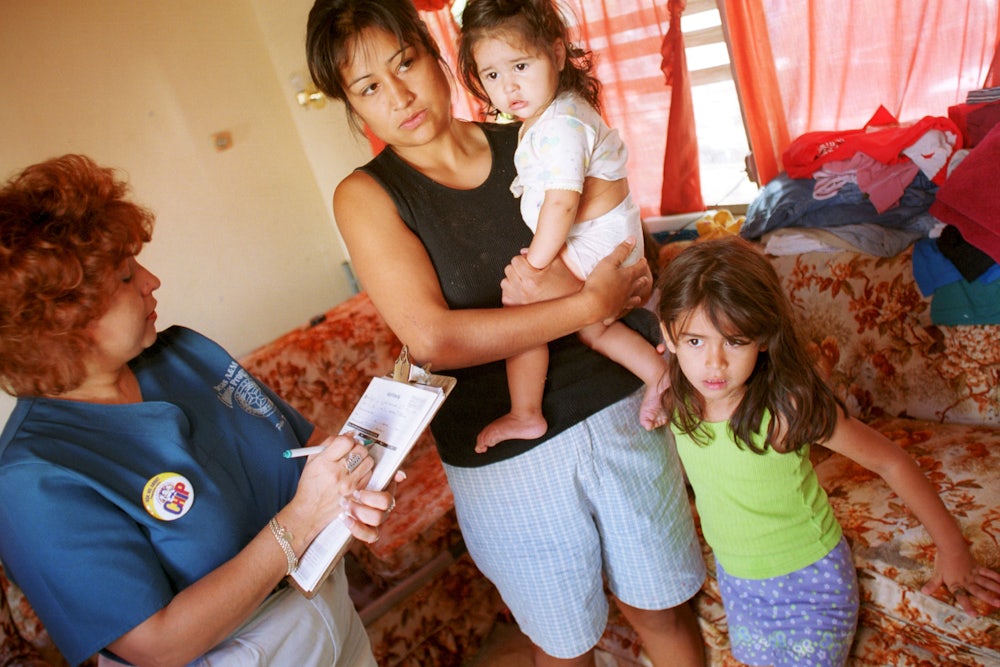This week, 18 million of the most vulnerable people in America will wait nervously to see if Republicans in Washington will axe their health coverage. I’m not talking about the repeal of Obamacare. Two other programs expire at the end of this week, and without their reauthorization, millions of impoverished children and the desperately poor will be cut off from the only source of health care coverage they could ever hope to obtain. It’s an example of how Obamacare has overwhelmed every other health care public policy issue, and the results could be catastrophic.
As of Monday morning, we’re still not sure that there will even be a Senate vote on the latest repeal effort, Cassidy-Graham. With two Republicans (Rand Paul and John McCain) firmly opposed and one more, Susan Collins, all but against it, there seems to be no path to the necessary 50 votes. Even Ted Cruz begged off on Sunday. But Republicans have backed themselves into such a corner with their base, promising repeal for seven years, that the leadership keeps plugging away. That’s likely to continue until the September 30 deadline under current reconciliation rules.
This uncertainty is toxic for other important measures that face the same deadline. As of last year, 8.9 million children, mostly those whose families earn less than 200 percent of the poverty line, get covered through the Children’s Health Insurance Program (CHIP), which also pays for thousands of births and postpartum care services for low-income pregnant women. CHIP operates like Medicaid, as a state-federal partnership, and federal funding must be reauthorized by the end of the month.
Children wouldn’t be cut off right away; it depends on how states manage their programs. But at least ten, including California and its two million enrollees, would see fairly immediate impacts, including enrollment freezes and a shortfall in paying for care. The Senate Finance Committee announced an agreement on a five-year extension last week, but with the Cassidy-Graham mess, it’s unclear if they’ll get the floor time to pass it. And the House hasn’t acted at all.
But that’s not all. Enhanced funding for thousands of community health centers, which have provided care for underserved communities since being established during Lyndon Johnson’s War on Poverty, also faces a Saturday expiration date. Community health centers are the dirty little secret of the U.S. system—a safety net that looks as much like Britain’s National Health Service as anything. In most cases, anyone can enter a center for care, regardless of ability to pay or even immigration status. More than single payer, this is actually socialized medicine.
It’s also astonishingly popular. If no action is taken this week, 70 percent of current funding levels for community health centers would be lost, likely forcing the closure of 2,800 facilities nationwide and the loss of 50,000 provider and staff jobs. Twenty-five million Americans use these centers each year, nearly three-quarters of them below the poverty line. An estimated nine million would be left with no medical home if funding expires.
These clinics serve a diverse set of communities—downtrodden urban areas and low-density rural regions with no other health care providers. One in ten Montanans get some health care from a community health center. Four hundred thousand Tennesseans use them, and almost that many South Carolinians. With that deep a funding cut, all of these facilities, in red states and blue states, are at some level of risk, forced to bar new patients, scale back services like dental care or drug treatment, or shut down. And local papers from California to North Carolina are raising the alarm.
Maybe no other major issue could get 70 senators from both parties on a letter of support, but Democrat Debbie Stabenow and Republican Roy Blunt did it for community health center funding last week. For all the ideological hot air, Democrats and Republicans are perfectly thrilled to support something as centrally planned and disruptive to the marketplace than any single payer system. Independent Bernie Sanders and Republican Bill Cassidy will be debating health care on CNN on Monday night, but both of them signed this letter to expand a government-funded health care provider network. (Sanders was actually instrumental in getting five years of enhanced community health center funding into the Affordable Care Act. Congress extended the funding in 2015, but only through September.)
Despite this rare bipartisan support, nothing has been done to extend the funding. A five-year extension has been introduced in the House, but no floor time has been scheduled. Consumed with the war over Obamacare, Congress has let this enormously successful program get lost in the shuffle.
Put together the patients at risk from expiring CHIP funding and community health center funding, and you get 18 million. And this population of Americans, which includes the homeless, poor pregnant women, the uninsured, the addicted, and the undocumented, is by and large more vulnerable to loss of health care access as those at risk in Obamacare repeal.
Obamacare has taken on a meaning that goes far beyond its actual function. It has helped to dramatically lower the uninsured rate, no doubt. But it’s still just part of a series of programs that assist people with coverage. Allow any one of those to falter and the whole system buckles. Obamacare could be working spectacularly, but without CHIP or community health center funding, the nation’s health care system would sink into absolute crisis.
Maybe you believe, as I do, that such a Rube Goldberg delivery system for health care makes no logical sense. In fact, the looming CHIP/community health center deadline serves as a good argument for a single-payer system where no one part of the program can fall through the cracks so easily. But that’s not where we are this week. We’re staring down the barrel of a health care catastrophe, and congressional leaders are busy trying to salvage campaign promises and play to their most ideological of supporters.
